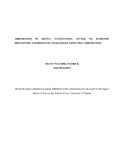| dc.description.abstract | Solving Disputes at any level should be encouraged by creating mechanisms that resolve disputes fast and with least cost. The citizen should not be left to despair in the pursuit of justice but instead the legal institutions/facilitators should create an enabling environment that enhances the delivery of justice at any forum. It would be very noble if members of a society would take the responsibility of resolving their own disputes by creating a system of justice that fosters arbitration. This is a system that delivers justice outside the formal court justice framework. Arbitration removes the emphasis on procedure and legal technicalities. This is unlike the formal court justice framework which is time consuming and tedious to the masses where the middle and low income commercial and civil disputes are in plenty. Access to dispute solving mechanisms should be simple and quick. An effective justice system is one that; is accessible, dispenses justice without delay and in accordance to law and equity. It acts as a tool that aids in the creation of a cohesive society. These can be provided with an effective arbitration system. With the current economic growth and development in Nairobi, Nakuru and Kericho courts in these counties are struggling with case management. The challenges include; a case backlog, few judges and magistrates to hear cases, lack of judicial facilities and lack to access of those facilities where available. This then clogs access to the court justice system, increases legal costs and the citizen are left to despair and their hearts cringe when they have to go and seek justice in court. This paper will discuss the removal of challenges in the arbitration process. The research seeks to unravel the challenges that hinder the society from using arbitration, or if they use arbitration where can we add emphasis (within the arbitration process) and enhance its access. The paper shall endevour to ensure that arbitration can be accessible; disputes can be disposed of timely and without delay.
Courts are not a panacea to solving all the disputes in Kenya and specifically; Nairobi, Nakuru and Kericho. It is the responsibility of the legal actors to make either of the antagonistic parties to a matter access a solution in a timely manner and with least expenses and the arbitration process should thus be considered as an option better than the court justice system. In Nairobi, Nakuru and Kerichothe arbitration framework is still developing. Institutional membership is increasing, the Nairobi Centre for International Arbitration has been created about an year ago, arbitration trainings and seminars are being organized frequently but is this being felt at the dispute solving level. This paper will also involve the collection of data from Nairobi, Nakuru and Kerichocounties to identify the challenges that face the litigants and legal professionals in the access to arbitration. At the conclusion there will be anevaluation of the challenges identified as hindering the arbitration process and thereafter propose solutions to ameliorate the challenges identified. There will be proposals of ways that will lead to enhanced access of arbitration and methods that reduce the barriers to arbitration. | en_US |

